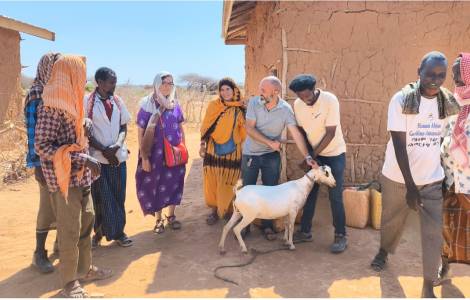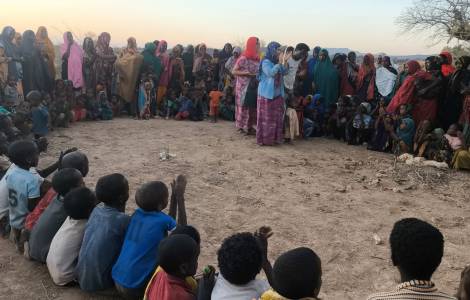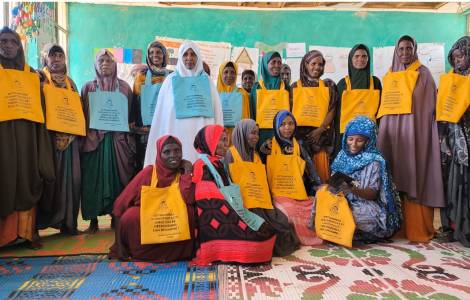
TZ
Robe (Agenzia Fides) - "It all began when in Robe we saw how many people were fleeing the persistent drought in eastern Bale. Interested and concerned, we set out to find out what was happening there. We found an area where the climate scenarios were very different from those in the greener areas around Robe," said Teresa Zullo, a missionary from the Missionary Community of Villaregia, who, along with other missionaries from the Apostolic Prefecture of Robe, west of Bale, set out for the eastern part of the region.
"This area belongs to the Apostolic Prefecture of Robe, whose Apostolic Prefect is Fr. Angelo Antolini, Ofm Cap, and is equivalent to a third of Italy, although there is still no ecclesiastical presence there. We are close to the Somali region of Ethiopia; poverty is particularly serious here, exacerbated by the lack of roads, the isolation of many villages, and the difficulty of obtaining water and basic necessities," the missionary explained.
"In 2022, we began to explore this vast region of Ethiopia, located an average of 6-7 hours by car from the city of Robe, where, as mentioned above, there is virtually no Catholic presence. While there are occasional Orthodox and Protestant communities in the provincial capitals, the majority of the population is Muslim. Upon returning from our first trip, we felt a strong call to 'be' with this people and to offer not only material assistance, but a closeness based on listening, respect, and love," emphasizes Teresa Zullo.
"Our adventure began in March 2023, when we visited some villages in Seweyna province, bringing small quantities of essential goods to help combat the famine," Teresa continues. "Despite the many difficulties and limited aid, we were immediately welcomed with curiosity and sympathy by the village leaders and families. For us, this was a sign that we were on the right path: becoming neighbors and building fraternal relationships. In June 2023, the turning point came: Seweyna's Women and Children's Office (the provincial social services office) asked us for help in combating 'barmatilee' (in the Oromo language, meaning "cultural countervalues"), including female genital mutilation, which sadly affects more than 90% of the female population, and early marriage, which occurs in approximately 60% of cases. We immediately set to work, collecting and compiling materials, illustrations, and testimonies to prepare a training course in the Oromo language, initially aimed at village administration representatives. Thanks to the expertise of some friends and the Ethiopian Muslim Development Agency in Addis Ababa, we were able to further deepen our understanding of the Islamic perspective on these practices and discovered that they are not mentioned in the Quran or in the main Islamic sources, while they are called upon not to harm God's creation. We then further enriched our content by adapting it for secondary school girls and boys."
The missionaries reported that to date, four such training sessions have taken place in high schools: two in Gololcha Province and two in Laga Hidha Province. In addition, there are seven training sessions for administrative heads of some villages: three in Seweyna Province, two in Laga Hidha Province, and Dawe Sarar Province. "When word got out about our training sessions," Teresa adds, "the women's and children's offices in other provinces began to contact us: first Laga Hidha, which borders the Somalia region, then Gololcha, which is closer to Robe. With each new request, we improve the material and bring it to the public." Along with the training, they also brought some symbolic gifts: food, hygiene kits for the women, and exercise books for the children, especially at the beginning of the school year."
The report on this initiative continues with a visit to the Dawe Sarar province, which also borders the Somali region. "The situation here is even more complex. Some villages can only be reached by crossing part of the Somali region, which is why neither NGOs nor public institutions can easily access them," says Teresa. "However, the local social services asked us to reach out to these more remote areas. Guided by the desire to meet the people, we made friends with three villages, where we offered training to the representatives. In one of these villages, Hantutu, we stayed overnight for two days and were welcomed with great warmth by the residents: They even cooked a special meal for us. Among other things, they asked us for help with health insurance for some refugees who had settled on the outskirts of the village. It was a moving experience that gave us a better understanding of the receptiveness of these people, but also of the complexity of life in this area."
"Recently, Gololcha Province also asked us to visit 11 villages, including the village of the Warra Dubee, an indigenous people living along the Wabe Shebelle River, which forms the border of our prefecture and where such practices are widespread," the missionary continues. "Laga Hidha has also contacted us again: they want more training and more material support for the women (exercise books for their children, food, and, above all, support for small income-generating activities). We are currently working primarily in the provinces of Dawe Sarar, Gololcha, and Laga Hidha, and we would like to further deepen our knowledge of this context and our activities. Of course, there are problems: the long distances, the lack of roads, the cost of fuel and vehicle maintenance, language barriers, limited funds and resources. But each time we return from a trip, the desire to build bridges of fraternity and solidarity grows within us."
Teresa concludes by emphasizing the special significance of the initiative. "Our journey in East Bale is not measured solely in numbers or statistics, but above all in relationships: men, women, and children who feel that someone is close to them, bringing them not only the bare necessities but also transmitting values such as respect, justice, and peace. When we see the smiles of the girls and boys who learn the importance of protecting their integrity, when we hear how the village leaders are working to change practices harmful to girls, we realize that this is the true miracle: a change that comes from the heart, even before the organization."
"East Bale is a place that touches the heart: we think of every person we have met, every handshake, every look of hope. The Lord leads us 'to the East' and teaches us each time how precious even the smallest step in fraternity is," the missionary concludes. (AP) (Agenzia Fides, 12/4/2025)

TZ

TZ